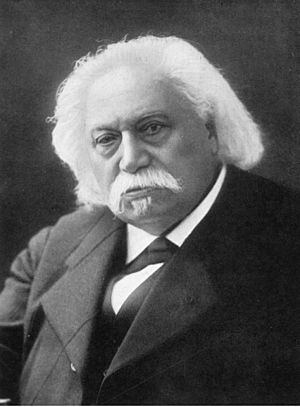Auguste Chauveau facts for kids
Jean-Baptiste "Auguste" Chauveau (1827–1917) was an important French professor and veterinarian. He made many discoveries in animal health and medicine. He was also a Fellow of the Royal Society.
His Amazing Discoveries
Auguste Chauveau was born in Villeneuve-la-Guyard, France, in 1827. He studied to become a veterinarian at two special schools in France. When he was 21, he started working at one of these schools in Lyon. Later, in 1875, he became the director of that school.
In 1886, he moved to Paris. There, he became a professor at the Muséum national d'histoire naturelle. He taught about comparative pathology, which is the study of diseases in different animals.
Throughout his career, Chauveau explored many scientific fields. He studied tiny living things like microbiology (bacteria) and virology (viruses). He also worked on biochemistry, which is the chemistry of living things. He even studied how muscles create heat and energy, a field called muscle thermodynamics.
Understanding the Heart
Chauveau did important research on the heart. With another scientist named Étienne-Jules Marey, he studied how the heart beats. They looked at the different stages of a heartbeat and the pressure inside the heart. This work helped doctors understand how the heart works.
He also played a role in inventing a medical procedure called cardiac catheterization. This is when a thin tube is put into a blood vessel and guided to the heart. It helps doctors check the heart's health.
Fighting Diseases
In 1867, Chauveau did key experiments on how tuberculosis spreads. Tuberculosis is a serious lung disease. His research helped create rules for public health to stop the disease from spreading.
A type of bacteria, Clostridium chauvoei, is named after him. This shows how important his work was in understanding bacteria.
He wrote a famous book called Traité d'anatomie comparée des animaux domestiques. This book was also published in English as The comparative anatomy of the domesticated animals. He also helped start a science journal called Journal de Physiologie et de Pathologie Générale.


